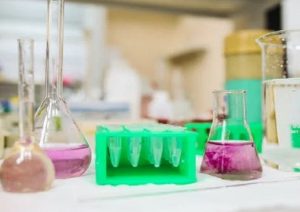The University of Benin (UNIBEN) Faculty of Physical Sciences, Department of Chemistry 300 Level (Year Three) Courses, Course Codes and Course Credits for First and Second Semester.
Chemistry is a subject which cuts across practically every facet of human development. It is the bedrock of most industries and the principal discipline in the technology for the processing of renewable and non-renewable resources.
Recommended: Uniben 200 level chemistry courses
UNIBEN 300L First Semester Chemistry Courses
| Course Code | Title | Credit |
| CHM310 | Practical Organic Chemistry | 2 |
| CHM311 | Aromatic and Alicyclic Chemistry | 3 |
| CHM312 | Inorganic Chemistry | 3 |
| CHM313 | Stereochemistry and Heterocompounds | 3 |
| CHM314 | Instrumental Methods of Analysis | 3 |
| CHM315 | Physical Chemistry | 3 |
| CHM316 | Practical Analytical and Inorganic Chemistry | 2 |
| CHM317 | Practical Physical Chemistry | 2 |
| CHM318 | Polymer and Rubber Science and Technology | 3 |
| CHM319 | Molecular Structure and Symmetry | 2 |
| CHM331 | Industrial Chemistry Practical | 2 |
| CED300 | Entrepreneurship | 2 |
| Total Credits | 24(E5) |
UNIBEN 300L Second Semester Chemistry Courses
| Course Code | Title | Credit |
| SIWES | Industrial Attachment | 3 |
| Total Credits | 03 |
CHM 310 – Practical Organic Chemistry Topics
a. Characterization and estimation of functional group in organic compounds.
b. Preparation of derivatives of organic compounds.
c. Preparation of simple organic compounds including Grignard reaction, Diels Alder reaction.
CHM 311 – Aromatic and Alicyclic Chemistry Topics
a. Benzene; Natural occurrence, properties, stability of benzene. Canonical structures of benzene; kekule. Dewall. Aromaticity classical treatment, comparism of aromatic and non-aromatic systems.
b. Polynuclear aromatic hydrocarbons (PAH). Types, occurrence. Canonical forms Reactivity of different positions in naphthalene, phenanthene and anthracene.
c. Important aromatic compounds; amines, amides, acids, phenols, aldehydes, ketones and diazonium compounds and derivatives. Natural sources, synthesis and properties.
d. Nucleophilic substitution reaction in aromatic systems
e. Alicyclic compounds: Types of compounds. Nomenclature of polycyclic alkanes; synthesis of alicyclic compounds and special reactions; strain theory. Conformational analysis
CHM 312 – Inorganic Chemistry Topics
The chemistry of the group (0 – 7) elements and emphasis is on correlation between theoretical concepts and experimental findings. Chemistry of transition elements, first, second and third series. Lanthanides and actinides. Hydrides, electron deficient compounds and boron chemistry. Introduction to radiochemistry.
CHM 313 – Stereochemistry and Hetero Compounds
a) Stereochemistry of compounds – with symmetric carbon – biphenyls. R, S specification of configuration.
b) Important methods of preparation and reactions of bifunctional compounds: glycols, halogen-acids, hydroxyl acid, dicarboxyclic acids, unsaturated acids, Lacto ketones and epoxides. Importance in synthesis of some organic compounds.
c) Simple hetero-compounds containing one, two or three hetero-atoms: nomenclature, synthesis and simple reactions.
CHM 314 – Instrumental Methods of Analysis
Optical methods of analysis: photometric titration photoluminescence spectroscopy, turbidity and nephelometry, fluorescence and phosphorescence. Flame emission and atomic absorption spectrometry, flame photometry.
Electrochemical methods, differential thermal analysis, potentiometric titration, voltametryamperometric titration methods, coulometry, polarographic technique, electrogravimetric methods. Differential thermal analysis, differential scanning calorimetry.
CHM315 – Physical Chemistry III Topics
a. Phase equilibra: thermodynamics of phase equilibria with one, two and three components. Mixture of two liquids – ideal system and Raoult’s law. Partition coefficients: Henry and Raoult law.
b. Surface Chemistry: colloids emulsion and foams. Adhesion and surface tension: contact angles and measurement, application of tensions. Adsorption: types of adsorption, Gibb absorption equations: isotherms. Heat of adsorption.
c. Electrochemistry conductance ionic theory. Debye – Huckel theory conductance at infinite dilution. Electrochemical cells, electrode potential Nernst equation applied electrochemistry; electrochemistry refining of copper electrolysis of alkyl halide, corrosion as an electrolysis of alkyl halide, corrosion as an electrochemical process.
CHM316 – Practical, Analytical & Inorganic Chemistry
Preparation of complex inorganic compounds. Chromatographic techniques. Gravimetric analysis and precipitation titration. Potentiometric titration. Flame photometry, polarimetry and refractometry
CHM317 – Practical Physical Chemistry 2
Phase equilibria. Electrochemistry – conductivity measurements. Absorption from solutions. Thermochemistry of neutralization reactions.
CHM 318 -Polymer and Rubber Science And Technology
a) Monomer, polymers, copolymers, polymers architecture (i. e. Structure), conformation of molecular chain etc). General methods of polymerization. Natural polymers, rubber, cellulose, wool, etc.
b) Linear chain Growth polymerization: Radical initiators. Mechanism of chain growth polymerization, chain transfer, branching, inhibition and retardation logic initiators, living polymers kinetics of chain growth polymerization. Auto acceleration copolymerization, kinetics of emulsion polymerization. Ring opening reactions.
c) Linear step – Growth polymerization. Reaction types. Reactivity, stoichiometry kinetics, extends of reactions, molar mass relationships, Gelation.
d) Rubber latex technology. Principles of rubber compounding . Rubber processing additives. Cross – linking agents, accelerators.
e) Molar mass characterization, light scattering osmometry viscometry, etc, optical techniques.
CHM 319 – Molecular structure and Symmetry
Schroedinger equation; Helium atom; Ground and excited States, Spin and Pauli Principle; Hydrogen molecule, Comparison of molecular orbital and valence bond theory, concept of resonance and configuration interaction; Coulson Fischer function; Molecular orbitals for diatomic molecules.
Simple pi – electron theory, Huckel theory; Walsh rules; Rotational, Vibrational and Electronic Spectra; Applications for determining bond lengths and angles; Brief mention of other methods; Atomic spectra; Russel Saunders Coupling; Orbital and spin angular momentum; Use of symmetry in Chemistry.
CHM 331 Industrial Chemistry Practical Topic
Food analysis processing. Polymer Science practical. Fastness properties of locally available dyes. Practical in extractive metallurgy.
Recommended: Uniben 100 to final year courses

Leave a Reply